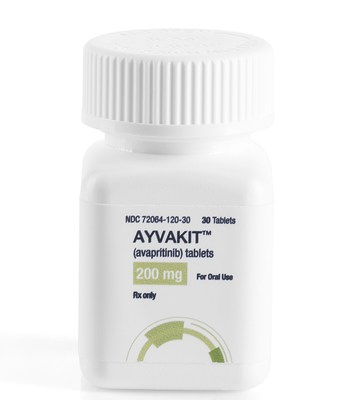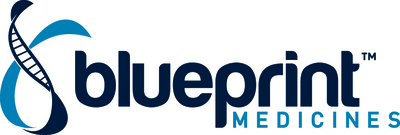FDA Approves Blueprint Medicines' AYVAKIT™ (avapritinib) for the Treatment of Adults with Advanced Systemic Mastocytosis
"Today's approval of AYVAKIT for advanced systemic mastocytosis – the fourth FDA approval across our portfolio in 18 months – culminates nearly a decade of hard work, from our scientists in the laboratory and clinical team conducting trials, to our commercial organization who will now bring AYVAKIT to patients," said
SM is a rare hematologic disorder caused by the KIT D816V mutation in nearly all cases. Across advanced SM subtypes, the median overall survival is approximately 3.5 years in ASM, approximately two years in SM-AHN and less than six months in MCL.1
"Advanced systemic mastocytosis is a debilitating disease characterized by extensive damage in multiple organ systems due to mast cell infiltration, and new treatment options are urgently needed to address these life-threatening complications," said
The FDA granted full approval to AYVAKIT for adults with advanced SM based on data from the Phase 1 EXPLORER trial and Phase 2 PATHFINDER trial.2 Treatment response was evaluated using modified IWG-MRT-ECNM criteria, with assessments based on at least 12 weeks of response duration, resolution of at least one finding of non-hematologic and hematologic organ damage, and 50 percent or greater reductions in biomarker response, mast cell burden and serum tryptase. The overall response rate (ORR) in the
AYVAKIT showed durable clinical efficacy in advanced SM patients across disease subtypes and regardless of prior therapy. In 53 evaluable patients who had a median follow-up of 11.6 months, the ORR was 57 percent (95% CI: 42%, 70%), and the proportion of patients with CR/CRh (28 percent), PR (28 percent) and clinical improvement (15 percent) is in line with previously reported results. The median duration of response was 38.3 months (95% CI: 19 months, not estimable). Warnings and precautions include intracranial hemorrhage, cognitive effects and embryo-fetal toxicity. AYVAKIT is not recommended for the treatment of patients with advanced SM with low platelet counts (less than 50,000/µL), which is consistent with current patient eligibility criteria in the EXPLORER and PATHFINDER trials. The most common adverse reactions were edema, diarrhea, nausea and fatigue/asthenia.
"People with advanced systemic mastocytosis face a scary, uncertain future due to life-threatening complications of the disease, as well as debilitating symptoms that often profoundly alter their ability to perform daily activities, and the FDA approval of a new therapy, AYVAKIT, brings much needed hope to these patients," said
"This milestone is also the culmination of many years of work across the systemic mastocytosis community, and we're proud of the contributions
For advanced SM patients receiving AYVAKIT,
The recommended dose of AYVAKIT in advanced SM is 200 mg once daily. AYVAKIT is available in 200 mg, 100 mg, 50 mg and 25 mg dose strengths for advanced SM patients.
Conference Call Information
About AYVAKIT (avapritinib)
AYVAKIT (avapritinib) is a kinase inhibitor approved by the FDA for the treatment of two indications: adults with Advanced SM, including ASM, SM-AHN and MCL, and adults with unresectable or metastatic gastrointestinal stromal tumors (GIST) harboring a PDGFRA exon 18 mutation, including PDGFRA D842V mutations. For more information, visit AYVAKIT.com. This medicine is approved in
AYVAKIT/AYVAKYT is not approved for the treatment of any other indication in the
To learn about ongoing or planned clinical trials, contact
About SM
SM is a rare disease driven by the KIT D816V mutation. Uncontrolled proliferation and activation of mast cells result in chronic, severe and often unpredictable symptoms for patients across the spectrum of SM. The vast majority of those affected have non-advanced (indolent or smoldering) SM, with debilitating symptoms that lead to a profound, negative impact on quality of life. A minority of patients have advanced SM, which encompasses a group of high-risk SM subtypes including ASM, SM-AHN and MCL. In addition to mast cell activation symptoms, advanced SM is associated with organ damage due to mast cell infiltration and poor survival.
Debilitating symptoms, including anaphylaxis, maculopapular rash, pruritis, diarrhea, brain fog, fatigue and bone pain, often persist across all forms of SM despite treatment with a number of symptomatic therapies. Patients often live in fear of severe, unexpected symptoms, have limited ability to work or perform daily activities, and isolate themselves to protect against unpredictable triggers. Historically, there had been no approved therapies for the treatment of SM that selectively inhibit D816V mutant KIT.
Important Safety Information
Serious intracranial hemorrhage (ICH) may occur with AYVAKIT treatment; fatal events occurred in <1% of patients. Overall, ICH (eg, subdural hematoma, ICH, and cerebral hemorrhage) occurred in 2.9% of 749 patients who received AYVAKIT. In Advanced SM patients who received AYVAKIT at 200 mg daily, ICH occurred in 2 of 75 patients (2.7%) who had platelet counts ≥50 x 109/L prior to initiation of therapy and in 3 of 80 patients (3.8%) regardless of platelet counts. Monitor patients closely for risk of ICH including those with thrombocytopenia, vascular aneurysm or a history of ICH or cerebrovascular accident within the prior year. Permanently discontinue AYVAKIT if ICH of any grade occurs. A platelet count must be performed prior to initiating therapy. AYVAKIT is not recommended in Advanced SM patients with platelet counts <50 x 109/L. Following treatment initiation, platelet counts must be performed every 2 weeks for the first 8 weeks. After 8 weeks of treatment, monitor platelet counts every 2 weeks or as clinically indicated based on platelet counts. Manage platelet counts of <50 x 109/L by treatment interruption or dose reduction.
Cognitive adverse reactions can occur in patients receiving AYVAKIT. Cognitive adverse reactions occurred in 39% of 749 patients and in 28% of 148 SM patients (3% were Grade >3). Memory impairment occurred in 16% of patients; all events were Grade 1 or 2. Cognitive disorder occurred in 10% of patients; <1% of these events were Grade 3. Confusional state occurred in 6% of patients; <1% of these events were Grade 3. Other events occurred in <2% of patients. Depending on the severity, withhold AYVAKIT and then resume at same dose or at a reduced dose upon improvement, or permanently discontinue.
AYVAKIT can cause fetal harm when administered to a pregnant woman. Advise pregnant women of the potential risk to a fetus. Advise females and males of reproductive potential to use an effective method of contraception during treatment with AYVAKIT and for 6 weeks after the final dose of AYVAKIT. Advise women not to breastfeed during treatment with AYVAKIT and for 2 weeks after the final dose.
The most common adverse reactions (≥20%) at all doses were edema, diarrhea, nausea, and fatigue/asthenia.
Avoid coadministration of AYVAKIT with strong and moderate CYP3A inhibitors. If coadministration with a moderate CYP3A inhibitor cannot be avoided, reduce dose of AYVAKIT. Avoid coadministration of AYVAKIT with strong and moderate CYP3A inducers.
To report suspected adverse reactions, contact
Please click here to see the full Prescribing Information for AYVAKIT.
About Blueprint Medicines
Cautionary Note Regarding Forward-Looking Statements
This press release contains forward-looking statements within the meaning of the Private Securities Litigation Reform Act of 1995, as amended, including, without limitation, statements regarding
References
1 Sperr WR, Kundi M, Alvarez-Twose I, et al. International prognostic scoring system for mastocytosis (IPSM): a retrospective cohort study. Lancet Haematol. 2019;6(12):e638-e649.
2 AYVAKIT™ (avapritinib) Prescribing Information (
Trademarks
![]() View original content to download multimedia:http://www.prnewswire.com/news-releases/fda-approves-blueprint-medicines-ayvakit-avapritinib-for-the-treatment-of-adults-with-advanced-systemic-mastocytosis-301314129.html
View original content to download multimedia:http://www.prnewswire.com/news-releases/fda-approves-blueprint-medicines-ayvakit-avapritinib-for-the-treatment-of-adults-with-advanced-systemic-mastocytosis-301314129.html
SOURCE
Media Contact - Andrew Law, 617-844-8205, media@blueprintmedicines.com; Investor Relations Contact - Kristin Hodous, 617-714-6674, ir@blueprintmedicines.com



